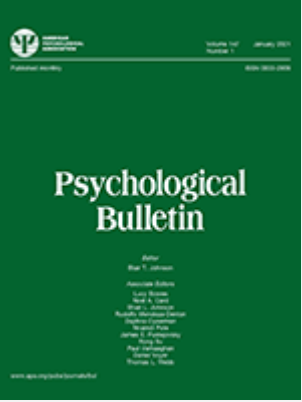On the relationship between unprompted thought and affective well-being: A systematic review and meta-analysis.
IF 17.3
1区 心理学
Q1 PSYCHOLOGY
引用次数: 0
Abstract
There is a growing recognition that thoughts often arise independently of external demands. These thoughts can span from reminiscing your last vacation to contemplating career goals to fantasizing about meeting your favorite musician. Often referred to as mind wandering, such frequently occurring unprompted thoughts have widespread impact on our daily functions, with the dominant narrative converging on a negative relationship between unprompted thought and affective well-being. In this systematic review of 76 studies, we implemented a meta-analysis and qualitative review to elucidate if and when unprompted thought is indeed negatively associated with affective well-being in adults. Using a multilevel mixed-model approach on 386 effect sizes from 23,168 participants across 64 studies, our meta-analyses indicated an overall relationship between unprompted thought and worse affective well-being (r¯ = -.18, 95% CI [-.23, -.14]); however, the magnitude and direction of this relationship changed when considering specific aspects of the phenomenon (including thought content and intentionality) and methodological approaches (including questionnaires vs. experience sampling). The qualitative review further contextualizes this relationship by revealing the nuances of how and when unprompted thought is associated with affective well-being. Taken together, our meta-analysis and qualitative review indicate that the commonly reported relationship between unprompted thought and affective well-being is contingent upon the content and conceptualization of unprompted thought, as well as the methodological and analytic approaches implemented. Based on these findings, we propose emerging directions for future empirical and theoretical work that highlight the importance of accounting for when, how, and for whom unprompted thought is associated with affective well-being. (PsycInfo Database Record (c) 2024 APA, all rights reserved).无提示思考与情感幸福之间的关系:系统回顾和荟萃分析。
越来越多的人认识到,思想的产生往往与外部需求无关。这些想法可以是回忆上次度假,也可以是思考职业目标,还可以是幻想与最喜欢的音乐家见面。这种经常出现的无诱因思绪通常被称为思绪游走,对我们的日常功能有着广泛的影响,主流观点认为无诱因思绪与情感幸福之间存在负面关系。在这篇包含 76 项研究的系统性综述中,我们采用了荟萃分析和定性综述的方法,以阐明无提示思考是否以及何时确实与成年人的情感幸福感存在负相关。通过对 64 项研究中 23,168 名参与者的 386 个效应量进行多层次混合模型分析,我们的荟萃分析表明,无提示思考与情感幸福感恶化之间存在整体关系(r¯ = -.18, 95% CI [-.23, -.14]);然而,当考虑到现象的特定方面(包括思考内容和意向性)和方法学方法(包括问卷调查与经验取样)时,这种关系的程度和方向发生了变化。定性综述通过揭示无提示思考如何以及何时与情感幸福相关联的细微差别,进一步说明了这种关系的来龙去脉。综合来看,我们的荟萃分析和定性综述表明,通常报告的无提示思维与情感幸福感之间的关系取决于无提示思维的内容和概念化,以及所采用的方法学和分析方法。基于这些发现,我们提出了未来实证和理论工作的新方向,强调了说明无提示思维何时、如何以及对谁而言与情感幸福相关的重要性。(PsycInfo Database Record (c) 2024 APA, 版权所有)。
本文章由计算机程序翻译,如有差异,请以英文原文为准。
求助全文
约1分钟内获得全文
求助全文
来源期刊

Psychological bulletin
医学-心理学
CiteScore
33.60
自引率
0.90%
发文量
21
期刊介绍:
Psychological Bulletin publishes syntheses of research in scientific psychology. Research syntheses seek to summarize past research by drawing overall conclusions from many separate investigations that address related or identical hypotheses.
A research synthesis typically presents the authors' assessments:
-of the state of knowledge concerning the relations of interest;
-of critical assessments of the strengths and weaknesses in past research;
-of important issues that research has left unresolved, thereby directing future research so it can yield a maximum amount of new information.
 求助内容:
求助内容: 应助结果提醒方式:
应助结果提醒方式:


